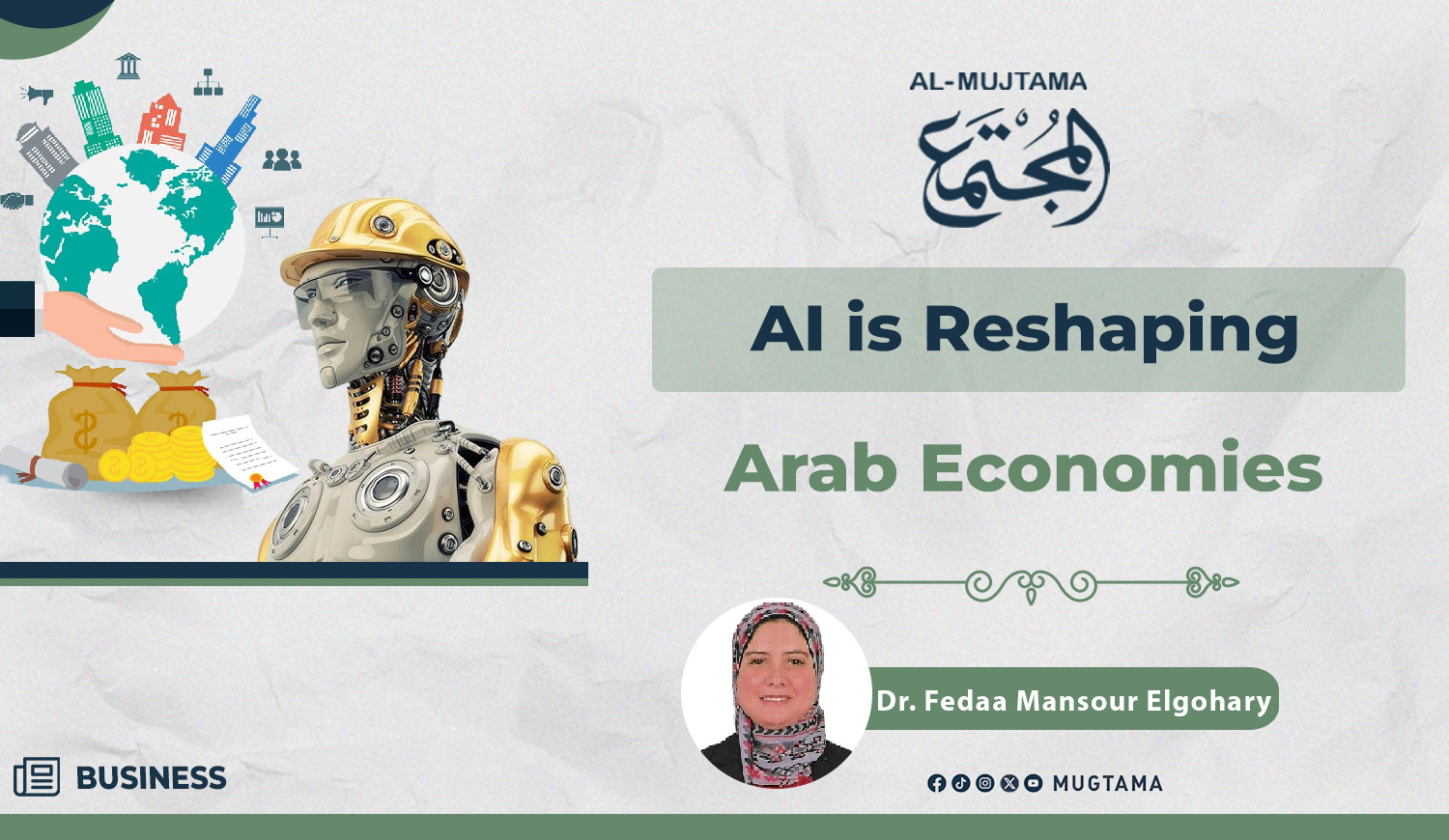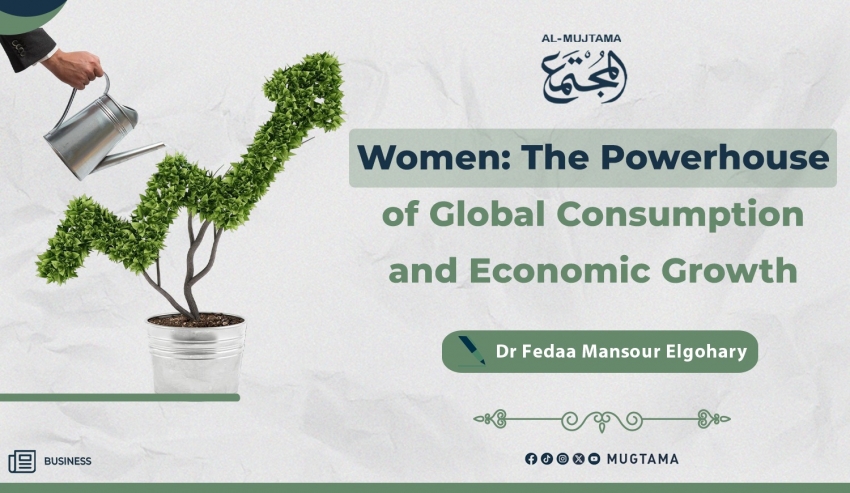The Dawn of the AI-Powered Arab Economy
Artificial Intelligence is Reshaping Arab Economies

Artificial intelligence is no longer just a promising
technology; rather, it has become the rising force that will reshape the global
economy. Estimates indicate that this technological revolution will inject
approximately $15.6 trillion into the global economy by 2030 (a figure
exceeding the current combined GDP of China and India). This massive impact is
expected to stem from a surge in productivity estimated at around $6.6
trillion, and improvements and benefits provided to consumers exceeding $9.1 trillion
(1).
Uneven Distribution of Benefits
However, some economies are expected to benefit far more than
others, as the extent to which countries successfully utilize artificial
intelligence, and consequently benefit from productivity gains, will vary
significantly.
The Arab World Embraces the AI Revolution
With the growing impact of the Fourth Industrial Revolution,
Arab governments and companies have begun to realize the global shift towards
artificial intelligence and are preparing strategies to regulate its use and
support its integration into various sectors. Estimates indicate that the
Middle East region will achieve approximately $320 billion of the total global
gains from artificial intelligence by 2030. The majority of these returns will
be for Saudi Arabia, where the contribution of artificial intelligence is
estimated at more than $135.2 billion during the same period.
AI's Potential to Revolutionize Arab Markets
Artificial intelligence can bring about a radical
transformation and a qualitative leap in Arab markets by innovating new
services and entirely new business models. Although artificial intelligence
technologies lead to the loss of some jobs and industries, they will also lead
to the emergence of entirely new jobs and industries.
Lessons from Technological Shifts
For example, when electricity replaced steam in factories,
workers no longer needed to gather around the central power source, which
allowed for more efficient production lines. Similarly, the time it takes a
lawyer to draft and review a single contract could see artificial intelligence
manage and draft 10 contracts. It is easy to imagine that the deployment of
artificial intelligence in some sectors will have a much larger positive impact
than expected, as the artificial intelligence revolution will bring about
tremendous changes in economies (2).
Sector-Specific Opportunities in the Arab Region
Naturally, the potential for adopting artificial intelligence
varies across sectors. Studies have found that the greatest opportunity for
artificial intelligence in Arab countries lies in the financial sector,
followed by the public services sector, including education and healthcare, and
then the manufacturing sector.
Artificial Intelligence in Arab Economies: Country
Focus
- Artificial Intelligence in the
UAE:
The UAE ranks first in the Arab world in the Global Innovation
Index for 2024, and 32nd globally (3). The UAE is expected to witness the
largest relative impact of artificial intelligence on its GDP, estimated at
around 14% in 2030, with a value of approximately $96 billion, and an average
annual growth in the contribution of artificial intelligence of 33.5% for the
period 2018-2030. This significant percentage reflects the prominence of
artificial intelligence in the government's strategic plans and the scale of
Emirati investment in new technologies and its support for both digital
transformation and innovation.
- Artificial Intelligence in Saudi
Arabia:
Saudi Arabia is ranked among the top 50 countries in the
Global Innovation Index for 2024 in terms of innovation capacity and output and
ranks second in the Arab world after the UAE. Saudi Arabia is expected to
achieve the largest gains from artificial intelligence applications at the
regional level, with estimates indicating that the contribution of artificial
intelligence may reach 12.4% of GDP by 2030. In this context, the Kingdom plans
to invest approximately $100 billion in this sector by the same year, which
demonstrates a strong commitment to developing and adopting artificial
intelligence technologies and the intensity of investment in them, with direct
support from the Saudi government, which is one of the early adopters of these
technologies (4).
- Artificial Intelligence in Egypt:
Egypt ranked tenth in the Arab world and 86th globally out of
133 economies in the Global Innovation Index for 2024. It also came in third
place in terms of the expected impact of artificial intelligence on its
economy, with artificial intelligence expected to contribute about $42.7
billion to the economy by 2030, equivalent to 7.7% of GDP. These expectations
come within the framework of the Egyptian government's adoption of a
comprehensive strategy to integrate technology into various sectors such as health,
agriculture, and transportation, with the aim of improving services, promoting
economic development, and achieving sustainable development goals.
- Artificial Intelligence in the GCC
Countries:
Besides Saudi Arabia and the UAE, the remaining GCC countries
such as Kuwait, Bahrain, Oman, and Qatar are witnessing major transformations
thanks to artificial intelligence. The contribution of this sector to these
economies is estimated at about $45.9 billion by 2030, which is equivalent to
about 8.2% of GDP, with an average annual growth in the contribution of
artificial intelligence of 28.8% for the period 2018-2030. These expected gains
are a result of high investments in innovation and technology, in addition to
government support for the development of digital infrastructure. This impact
could be even greater if governments continue to expand the horizons of
innovation and apply artificial intelligence in various companies and sectors.
The Inevitable Reality of AI in Arab Economies
Artificial intelligence is no longer a future option, but
rather a reality strongly knocking on the doors of Arab economies. Away from
the current hype surrounding this technology, the inevitable truth is that it
will bring about a comprehensive change in businesses, economies,
and even the policies that regulate them. While some Arab countries have begun
taking serious steps towards benefiting from this revolution, there are still
great untapped opportunities that could double the economic impact of
artificial intelligence in the region.
Challenges and Requirements for Full AI Adoption
Although artificial intelligence has the potential to bring about a qualitative leap in economies, reaping its fruits and fully benefiting from it requires more than just adopting the technology. It also includes overcoming the challenges associated with costs, regulatory obstacles, infrastructure, workforce readiness, and the
necessity of flexible and balanced regulatory frameworks.
The Future of AI in Shaping Arab Economies
As countries continue to invest and strategically plan,
artificial intelligence may transform from a mere support tool to a driving
force that reshapes Arab economies and opens new horizons for innovation,
sustainability, and global competitiveness. ___________________
(1) PWC
Middle East. (2025). “Which regions will gain the most from AI?”, Available at:
https://www.pwc.com/m1/en/publications/potential-impact-artificial-intelligence-middle-east.html
(2) Capital
Economics, (2025). “AI, Economies and Markets – How artificial intelligence
will transform the global economy”. Available at:
https://www.capitaleconomics.com/ai-economies-and-markets-how-artificial-intelligence-will-transform-global-economy
(3) Dutta,
Soumitra. et al. (2024), “Global Innovation Index 2024 Unlocking the Promise of
Social Entrepreneurship”, WIPO, 17th Edition. Available at:
https://www.wipo.int/web-publications/global-innovation-index-2024/assets/67729/2000%20Global%20Innovation%20Index%202024_WEB3lite.pdf
(4) PWC,
(2018). “The potential impact of AI in the Middle East” Available at:
https://www.pwc.com/m1/en/publications/documents/economic-potential-ai-middle-east.pdf












